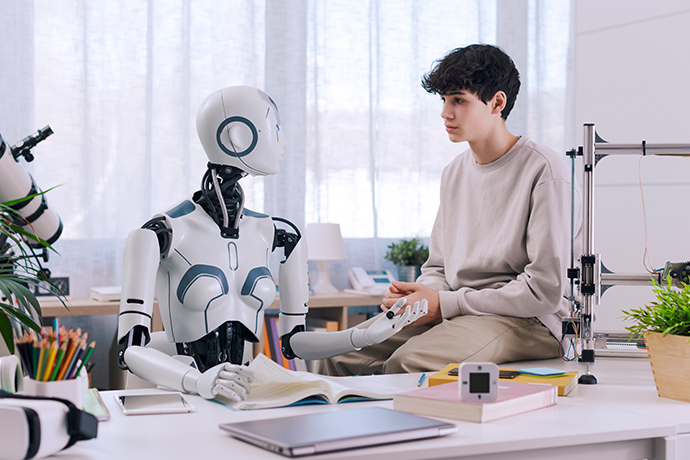 SPEAKERS
SPEAKERS
Generation Beta marks the first AI-native era, shaping life and technology like never before. Explore how this transformative generation will redefine our future.

Welcome to the future of humanity - Generation Beta: First AI-native era born with meta minds to reshape life technology. Come witness the digital, transformative touch forging the world ahead.
Flashback to the introduction of "artificial intelligence" in 1956, even to the 2010s, many never believed AI would become a global revolutionary system. Like the “Fifth Generation Computer System”, some think it will come and fade away. But behold, now it's different. Here in 2025 and years to come, we stand at the threshold of welcoming a remarkable new generation into our world.
No doubt this AI advanced version - not Gen X, Y, Z, or Alpha but Gen Beta - embodies innovations unlike ever before. Generation Beta - children born from 2025 onwards - will navigate a landscape fundamentally different from anything humanity has experienced over the years. Because tech adoption won't exist, they will never know a world without advanced artificial intelligence.
Wait, is Gen Beta the better generation we all await? In fact, what do we literally mean by AI-native generation beta? In this article, all the mysteries behind Gen Beta according to top creative speakers shall be discussed.
Unknowingly most times, many of us misinterpret Gen Beta as a new dispensation technology like “Gen AI.” Maybe because they both deal with artificial intelligence innovations or so. But, Gen Beta meaning extends far beyond just another demographic label. In fact, Mark McCrindle put it simply as “individuals born between 2025 and 2039.”
More comprehensively, we can define “Generation Beta” as the first cohort born into a fully AI-integrated society where machine learning, neural networks, and algorithmic decision-making shape everyday experiences. These children will grow up with AI tutors teaching them to read, smart toys responding to their emotions, and digital assistants anticipating their needs. Their formative years will unfold in homes where technology adapts to human behavior rather than the other way around.
The question of when will Gen Beta start has different answers depending on whom you ask. We typically consider 2025 as the starting point, marking children born when artificial general intelligence began transforming major industries.

Forget everything you've been told about AI's limits - Gen Beta characteristics are about to shatter our technological crystal ball. The seamless blending of human creativity with computational power will transform life far beyond our wildest imagination, redefining how we learn, work, communicate, and express ourselves in ways we cannot yet fully comprehend.
Quickly, let's the various potential areas where significant change will take place as a result of these generations' veto tech power:
Generation Beta's education will look starkly different from our current systems. We must prepare for classrooms where AI-personalized learning pathways are based on individual strengths, interests, and neurological profiles. These kids will likely develop different cognitive patterns than previous generations. They won't memorize information but instead, master the art of collaborating with machines to solve complex problems.
By the time Gen Beta characteristics fully emerge in the workplace, traditional career paths may become obsolete. We anticipate they'll pioneer entirely new industries built upon human-machine partnerships that leverage the uniqueness of both.
Laughing at our current notion of "screen time", these generations will experience seamless transitions between physical and digital realms. In this beta era, we anticipate entirely new forms of expression emerging as they communicate across multiple dimensions simultaneously.
Their language acquisition might include programming concepts alongside traditional grammar. Many will likely grow up bilingual - speaking both human languages and machine languages with equal fluency.
What will Gen Beta be like regarding their moral frameworks? We expect they'll develop ethics encompassing both human and artificial entities, with nuanced views on consciousness, rights, and responsibilities.
Their perspectives on privacy may differ radically from ours. Growing up with ambient computing might normalize constant data exchange while developing sophisticated boundaries around certain personal information.
Generation Beta's creativity will blend biological and computational thinking. We'll see art forms emerge that human minds alone could never conceive, sparked by collaborative human-AI creative processes.
Music, visual art, and storytelling will transform as these children discover entirely new aesthetic possibilities. Their creative works might simultaneously exist across physical and digital realms in ways we cannot yet visualize.
Community connections for Generation Beta will likely transcend geographic limitations entirely. We anticipate global peer groups forming around shared interests rather than proximity or cultural background.
Their friendships may include both human and non-human participants. Social hierarchies could reorganize around different values than those that currently determine status and influence.
The psychological development of Generation Beta deserves careful consideration. We must monitor how constant AI interaction shapes attachment styles, identity formation, and emotional intelligence.
Their sense of self might incorporate technological extensions more fluidly than previous generations. The boundary between personal thoughts and externalized cognition could become increasingly permeable.
As generations speakers and researchers often note, each cohort brings distinctive strengths to society. We believe Generation Beta will excel at integrating diverse perspectives, finding patterns in complexity, and reimagining established systems.
These children will likely approach global challenges with collaborative mindsets shaped by their immersion in interconnected systems. Climate solutions, healthcare breakthroughs, and governance innovations may emerge from their unique worldview.
However, we must acknowledge potential vulnerabilities too. Generation Beta might struggle with skills requiring extended concentration without technological assistance or face unique psychological challenges from their unprecedented developmental environment.

We stand at an extraordinary moment in human history as we prepare to welcome Generation Beta. Their arrival marks not just a demographic shift but a fundamental reimagining of what it means to be human.
Join us in creating a world that nurtures the best of what this AI-native generation can become. Let's build frameworks that support their development while preserving essential human connections and values for this remarkable generation stepping into our rapidly transforming world.